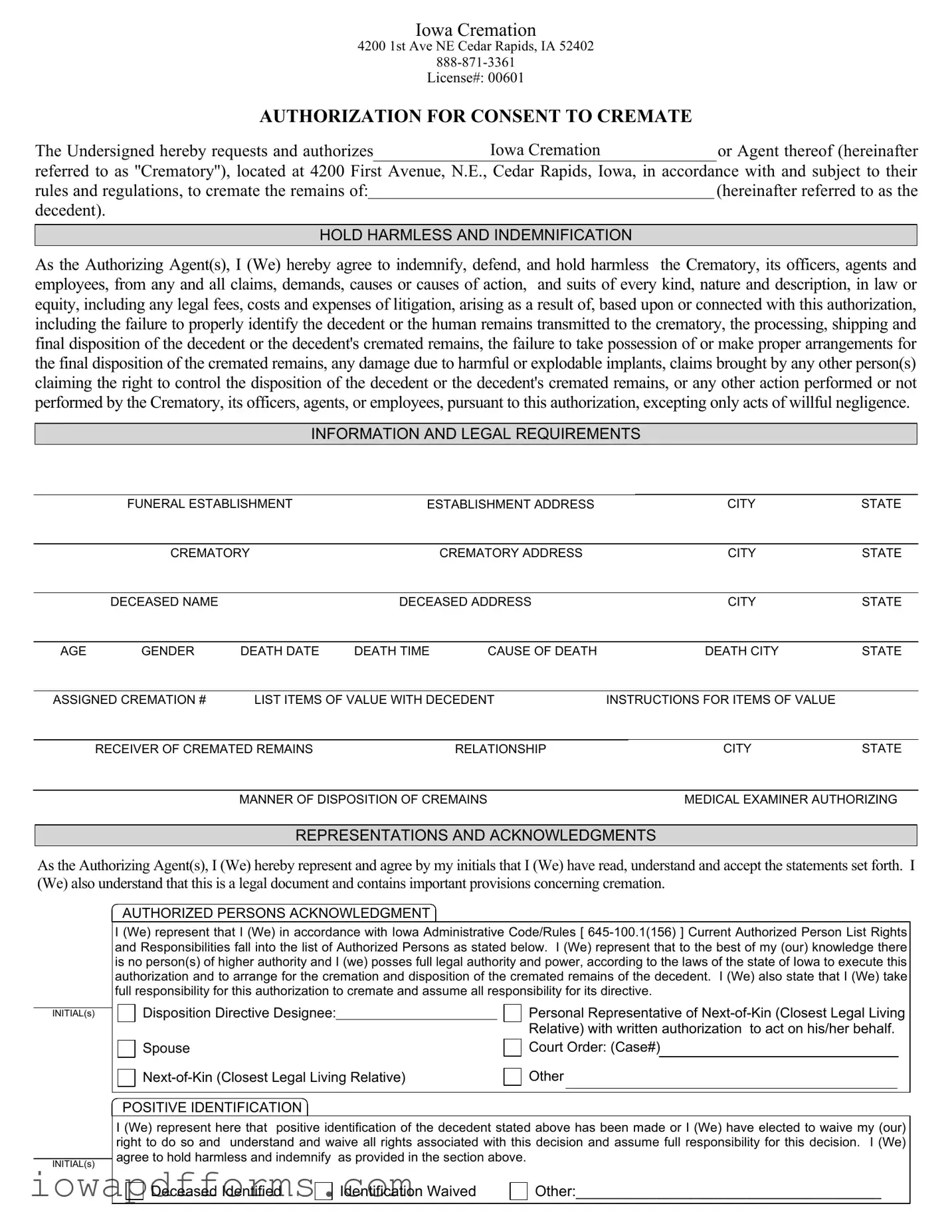The Iowa Cremation Authorization form shares similarities with the Funeral Service Contract, which outlines the services provided by a funeral home. Both documents require the signature of an authorized individual, ensuring that the funeral home can proceed with the arrangements. They specify the services to be rendered, including cremation, and detail the financial obligations of the authorizing agent. Additionally, both documents serve as legal agreements, holding the signatory responsible for the decisions made regarding the deceased's remains.
Another comparable document is the Authorization for Embalming form. This form is used when a family decides to embalm the body before a funeral service. Like the Iowa Cremation Authorization, it requires the consent of the authorized agent and includes provisions for indemnification. Both documents emphasize the importance of understanding the processes involved, ensuring that the family is aware of their rights and responsibilities concerning the deceased's remains.
The Disposition of Remains form is also similar, as it outlines the legal authority of the signatory to decide on the final resting place of the deceased. This form, like the Iowa Cremation Authorization, requires clear identification of the deceased and the relationship of the signatory. Both documents provide a framework for the final disposition, whether through cremation or burial, ensuring that the wishes of the deceased and their family are respected.
When dealing with real estate transactions in Texas, it is crucial to use the appropriate legal documents to ensure a smooth process. One such essential tool is the Texas Real Estate Sales Contract form, which delineates the responsibilities and agreements between the buyer and seller. This form is vital for avoiding ambiguities and establishing clear terms. For further reference, you can access the Texas Documents that provide all necessary details to facilitate the agreement properly.
The Next of Kin Affidavit bears resemblance to the Iowa Cremation Authorization form in that it identifies the individual who has the legal right to make decisions regarding the deceased. This affidavit confirms the relationship of the signatory to the deceased, similar to how the cremation authorization requires the authorizing agent to assert their authority. Both documents aim to clarify who has the legal standing to make decisions about the remains.
Similarly, the Medical Release form is pertinent, as it allows for the disclosure of medical information necessary for the cremation process. This form, like the Iowa Cremation Authorization, ensures that the crematory is informed about any medical devices or conditions that may affect the cremation. Both documents prioritize safety and compliance with legal requirements, safeguarding the interests of all parties involved.
The Authorization for Autopsy form is another related document. It grants permission for an autopsy to be performed on the deceased, often required to determine the cause of death. Like the cremation authorization, it necessitates the consent of the authorized agent. Both documents underscore the necessity of informed consent and the understanding of the implications of such decisions on the final disposition of the body.
The Will or Last Testament also bears similarities, as it outlines the wishes of the deceased regarding their remains and estate. While the cremation authorization focuses specifically on the cremation process, both documents highlight the importance of the deceased's wishes. The authorized agent must ensure that the provisions of the will are respected, particularly if cremation is specified as the preferred method of disposition.
The Power of Attorney for Health Care is another document that shares similarities with the Iowa Cremation Authorization. It designates an individual to make medical decisions on behalf of the deceased, particularly in cases where they cannot express their wishes. Both documents require the signatory to have a clear understanding of their authority and responsibilities, ensuring that the deceased's preferences are honored in matters of health and disposition.
The Authorization for Release of Information form is relevant as well, as it allows designated individuals to access sensitive information about the deceased. This document, like the Iowa Cremation Authorization, requires the consent of the authorized agent and ensures that all parties are aware of their rights regarding personal information. Both forms prioritize transparency and respect for the deceased's privacy.
Finally, the Death Certificate Application is similar in that it is a necessary document for finalizing the disposition of the deceased. It requires accurate information about the deceased and must be completed by the authorized agent. Like the Iowa Cremation Authorization, it serves as a legal record that supports the actions taken regarding the remains, reinforcing the importance of proper documentation in the process of handling a loved one's passing.



